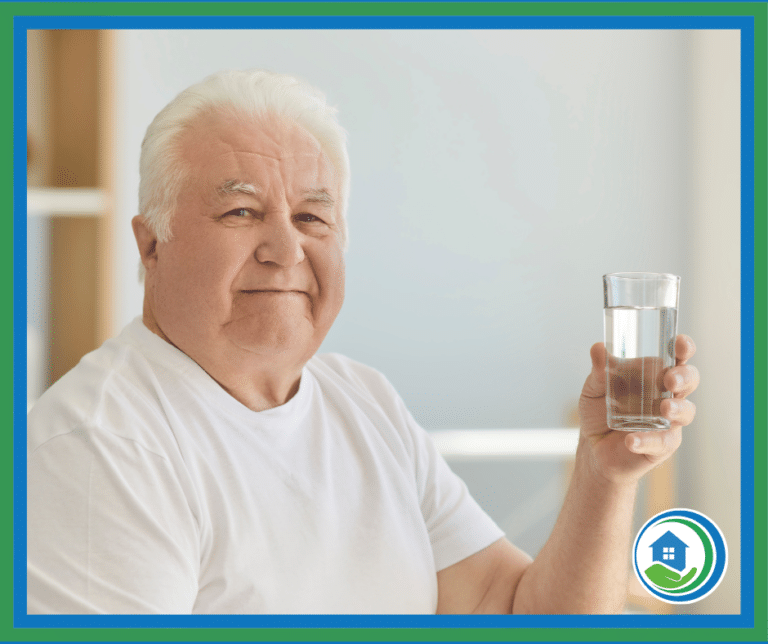According to studies, more than 70% of seniors are chronically dehydrated. You may already know that dehydrated seniors can suffer from symptoms like dry mouth. However chronic dehydration can cause a lot of unexpected symptoms that you may not realize are due to dehydration.
If you’re worried that your senior parent suffers from chronic dehydration because they are not drinking enough water consider getting senior home care for them. Seniors who have senior home care are more likely to avoid dehydration, malnutrition, and other chronic conditions because they have someone in the home with them to remind them to drink water, help them cook healthy meals, and focus on maintaining their physical health.
Some of the unexpected symptoms of dehydration that can occur in chronically dehydrated seniors include:
Confusion and Cognitive Impairment
Dehydration can affect cognitive function and lead to confusion, disorientation, and difficulty concentrating, especially in seniors. Older adults may become easily confused, forgetful, or have trouble making decisions, which can be mistaken for signs of dementia or age-related cognitive decline. Dehydration-induced cognitive impairment can impair judgment and increase the risk of accidents and falls.
Weakness and Fatigue
Seniors experiencing dehydration may feel weak, lethargic, or excessively tired, even with minimal physical exertion. Dehydration reduces blood volume and impairs circulation, leading to decreased oxygen and nutrient delivery to muscles and tissues. This can result in muscle weakness, fatigue, and a general sense of low energy, making it challenging for seniors to perform daily activities.
Dizziness and Lightheadedness
Dehydration can cause a sudden drop in blood pressure upon standing, leading to dizziness, lightheadedness, and feelings of unsteadiness. Dehydrated seniors who experience dizziness and lightheadedness, as a result, are more likely to fall than seniors who are well-hydrated. Dehydration can also make dizziness or vertigo which is a side effect of medications worse.
Urinary Symptom
Dehydration can manifest as changes in urinary habits and symptoms in seniors, including decreased urine output, infrequent urination, or dark-colored urine. Older adults may experience urinary urgency, frequency, or discomfort, which can be mistaken for urinary tract infections or bladder problems. Dehydration can make pre-existing urinary issues worse. And it increases the risk of urinary complications in seniors.
Increased Heart Rate
Dehydration can cause an increase in heart rate, known as tachycardia, as the body attempts to compensate for decreased blood volume and maintain adequate circulation. Seniors may experience palpitations, rapid heartbeat, or irregular heart rhythms due to dehydration-induced cardiovascular stress. Seniors should always see their doctors if they are experiencing changes in their heart rate, but you should know that dehydration can contribute to a high heart rate.
Muscle Cramps and Joint Pain
Dehydration can contribute to muscle cramps, spasms, and joint pain in seniors, particularly during physical activity or in hot weather. Electrolyte imbalances resulting from dehydration disrupt muscle function and increase the risk of cramping and stiffness. Seniors may experience joint discomfort, stiffness, or reduced range of motion due to dehydration-related muscle and electrolyte disturbances. In the summer seniors should drink electrolyte water or sugar-free sports drinks to make sure their electrolytes are high enough.
Headaches and Migraines
Dehydration can trigger headaches and migraines in seniors, causing throbbing pain, sensitivity to light and noise, and nausea. Older adults may experience dehydration-induced headaches due to changes in blood flow to the brain and alterations in cerebral perfusion. Chronic dehydration can exacerbate migraine symptoms and increase the frequency and severity of headaches in seniors.
Tight Skin
Tight skin is something that happens to seniors as they age because aging skin loses the fat pad underneath the skin which increases elasticity. However, dehydration can make tight skin worse and cause skin to lose more elasticity. A great way to test for dehydration is to pinch a small fold of skin, if it returns to normal quickly then the skin is hydrated.
If you or an aging loved one are considering Senior Home Care in Denton, TX, please contact the caring staff at Clear Path Home Care today at (817) 928-5788
Clear Path Home Care provides compassionate, high-quality home care in Denton County, Montague County, Cooke County, Grayson County, Fannin County, Lamar County, Wise County, Collin County, Hunt County, Delta County, and Hopkins County in Texas.
- The Importance of Lighting for Seniors in their Homes - June 6, 2024
- Understanding the Importance of Meal Planning for Seniors - May 23, 2024
- Tips for Helping a Senior Parent Shower Safely - May 14, 2024






